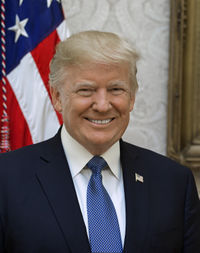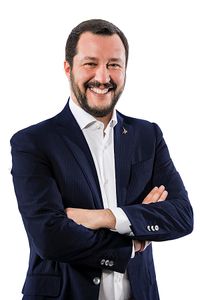Populist Revolution
 From Conservapedia
From Conservapedia 
The Populist Revolution is a term used to describe a recent international event of countries moving toward populism. This revolution began with Brexit and the election of U.S. President Donald John Trump.
Afterwards, populist figures began to achieve prominent positions and leaderships in different countries. For example, Doug Ford, a right-wing populist, was elected Premier of Ontario in Canada[1], and the runner-up was a left-wing populist named Andrea Horwath.[2] Mexico elected a left-wing populist as its President,[3] and Brazil elected a right-wing populist President, Jair Bolsonaro[4][5], notable for his boldness and fervent anti-globalism, anti-communism, anti-feminism, anti-environmentalism, and anti-establishment stances. He replaced his corrupt establishment predecessor. Italy elected a right-wing populist, Matteo Salvini,[6] and Steve Bannon has been attempting to assist his and other current populist administrations, as well as populist movements, in various European countries.[7] Viktor Orban, a right-wing populist, nationalist, and social conservative was elected in Hungary.[8] Ukraine elected a populist after ousting its pro-Russian leaders.[9][10]
In 2017, Robert Mugabe, the dictator of Zimbabwe, was ousted and the nation was democratized.[11]
In 2019, Britain elected the right-wing populist and explicitly pro-Brexit Boris Johnson[12] after the second imprisonment of Tommy Robinson.[13] Democrats running for President of the United States in 2020 began pandering to left-wing populists after witnessing the success of Bernie Sanders' campaign[14], which required illicit tactics and establishment cronyism by the Hilary Clinton campaign team to defeat in 2016.[15][16][17][18][19]
Contents
Leaders favorable to populism elected before the Populist Revolution[edit]
Narendra Modi of India and Benjamin Netanyahu of Israel were leaders of their countries before the Populist Revolution, and both congratulated Donald Trump on his electoral success in 2016.[20][21] Both have been very conservative in the leadership of their respective countries, which are both Western democracies.
United States of America[edit]

Donald J. Trump left the establishment flabbergasted when he won the presidential election in 2016.[23] His victorious campaign is best exemplified by this quote from Gandhi, "First they ignore you, then they laugh at you, then they fight you, then you win." President Trump has been very populist in his governing of the United States, implementing tariffs and protectionism, reforming the criminal justice system, and pulling the U.S. out of harmful globalist international deals.
Also, 2020 Democrats have imitated the left-wing populism of Bernie Sanders, who has been endorsed by populist paleoconservative Ann Coulter.[24] However, they have been harshly criticized even by right-wing populists due to their brand of populism being radically extremist, socialist, environmentalist, feminist, and favouring identity politics more extreme even than that which elected Barack Hussein Obama in 2008 (which is why they criticized Obama for not being extreme enough, and called Joe Biden racist or implied that he was (which is somewhat true)). Moving so far to the left, they have alienated working Americans, including many of the "Bernie Bros" who supported Bernie Sanders in 2016.[25]
Canada[edit]
In the capital province of Ontario, populist Doug Ford is the Premier, and left-wing populist Andrea Horwath, who has been referred to as a "right-wing populist" by the Star,[26] is the Leader of the Opposition.
In addition, Maxime Bernier, former member of the Conservative Party of Canada and current leader of the populist People's Party of Canada (PPC), is running for Prime Minister of Canada.[27]
Europe[edit]
Italy[edit]
Leftists have arrogantly referred to Matteo Salvini's Italy as "Fascist Italy,"[28] but Matteo Salvini is a freedom-loving populist who is allied with Donald Trump and Steve Bannon.
Hungary[edit]
Despite being a collectivist, telling Jordan Peterson he would like to "debate" him on individualism,[29] Viktor Orbán is Euroskeptic, anti-globalist, and oppposed to George Soros.
Poland[edit]
The conservative Law and Justice became the first party since the fall of Communism to gain an absolute majority in Poland's parliament in 2015.
Ukraine[edit]
Not only did he play the President in a television series, President Zelensky has witnessed the persecution of the Ukrainian people and has the support of the working class.
Britain[edit]
Boris Johnson has been called the "Trump" of Britain, and is supported by Prime Minister Benjamin Netanyahu of Israel.[30] He has been a strong advocate for Brexit.
Latin America[edit]
Brazil[edit]
Jair Bolsonaro has made news for rejecting dark money from environmentalists to fight forest fires, ridiculing globalist Emmanuel Macron and his wife, and refusing to accept the global warming myth.
Mexico[edit]
After the threat of tariffs by the Trump administration in 2019, President Obrador agreed to work with the U.S. to manage illegal immigration.[31]
References[edit]
- ↑ https://www.therebel.media/doug_ford_victory_speech_we_have_delivered_a_government_that_is_for_the_people
- ↑ https://torontosun.com/opinion/columnists/goldstein-horwath-steers-ndp-hard-to-the-left
- ↑ https://www.usatoday.com/story/news/world/2018/07/02/mexico-president-left-leaning-populist-elected-wide-margin/750191002/
- ↑ https://www.washingtontimes.com/news/2018/oct/28/jair-bolsonaro-elected-brazil-president/
- ↑ https://www.breitbart.com/latin-america/2018/10/28/jair-bolsonaro-elected-president-of-brazil/
- ↑ https://www.breitbart.com/europe/2018/03/05/populists-sweep-italian-national-elections-5-star-movement-big-winner/
- ↑ https://www.youtube.com/watch?v=p5pvKpFi5vY
- ↑ https://hungarytoday.hu/breaking-amid-high-voter-turnout-viktor-orbans-ruling-fidesz-party-wins-hungarian-parliamentary-elections/
- ↑ https://www.forbes.com/sites/katyasoldak/2019/04/21/ukrainian-humor-a-comedian-is-elected-president/#1a6e1bdcd140
- ↑ https://www.jewishpress.com/news/global/europe/ukraine/ukraine-elects-jewish-president-volodymyr-zelensky/2019/04/22/
- ↑ https://www.foxnews.com/world/mugabes-37-year-reign-in-zimbabwe-appears-over-after-military-take-control
- ↑ https://freedomwire.com/boris-johnson-elected-british-prime-minister/
- ↑ https://www.therebel.media/breaking_tommy_robinson_sentenced_to_prison_again_for_journalism
- ↑ https://video.foxnews.com/v/6071875509001/#sp=show-clips
- ↑ https://www.bbc.com/news/world-us-canada-41850798
- ↑ https://globalnews.ca/news/5136890/bernie-sanders-supporters-democratic-party-2016/
- ↑ https://www.vanityfair.com/news/2017/11/donna-brazile-hillary-clinton-bernie-sanders
- ↑ https://www.vox.com/policy-and-politics/2017/11/14/16640082/donna-brazile-warren-bernie-sanders-democratic-primary-rigged
- ↑ https://www.washingtonpost.com/news/the-fix/wp/2017/11/02/ex-dnc-chair-goes-at-the-clintons-alleging-hillarys-campaign-hijacked-dnc-during-primary-with-bernie-sanders/
- ↑ https://www.hindustantimes.com/india-news/appreciate-friendship-towards-india-modi-congratulates-trump-on-us-election-win/story-fMMnp1rpsK2GVvzolVpAiL.html
- ↑ https://www.youtube.com/watch?v=rOMG4IOfH0I
- ↑ Ann Coulter cancels Berkeley event amid protests, says decision 'a dark day for free speech in America', Fox News, 2017
- ↑ https://www.youtube.com/watch?v=G87UXIH8Lzo
- ↑ https://www.realclearpolitics.com/video/2019/04/18/coulter_i_could_vote_for_bernie_sanders_if_he_returned_to_original_immigration_position.html
- ↑ https://www.libertynation.com/2020-dems-how-to-lose-votes-and-alienate-people/
- ↑ https://www.thestar.com/opinion/commentary/2014/05/08/andrea_horwaths_rightwing_populism_salutin.html
- ↑ https://www.youtube.com/watch?v=TIu_JBlI6PU&t=600s
- ↑ https://en.wikipedia.orghttps://www.conservapedia.com/index.php?title=Fascist_Italy&oldid=846231366
- ↑ https://www.youtube.com/watch?v=WRYmVzAgaA8
- ↑ https://www.jpost.com/Israel-News/Netanyahu-discusses-two-state-solution-with-Boris-Johnson-600732
- ↑ https://www.whitehouse.gov/briefings-statements/president-donald-j-trump-secures-historic-deal-mexico-combat-crisis-border/
Categories: [Movements] [2010s] [International Political Terms]
↧ Download as ZWI file | Last modified: 02/24/2023 22:27:40 | 100 views
☰ Source: https://www.conservapedia.com/Populist_Revolution | License: CC BY-SA 3.0
 ZWI signed:
ZWI signed:
 KSF
KSF